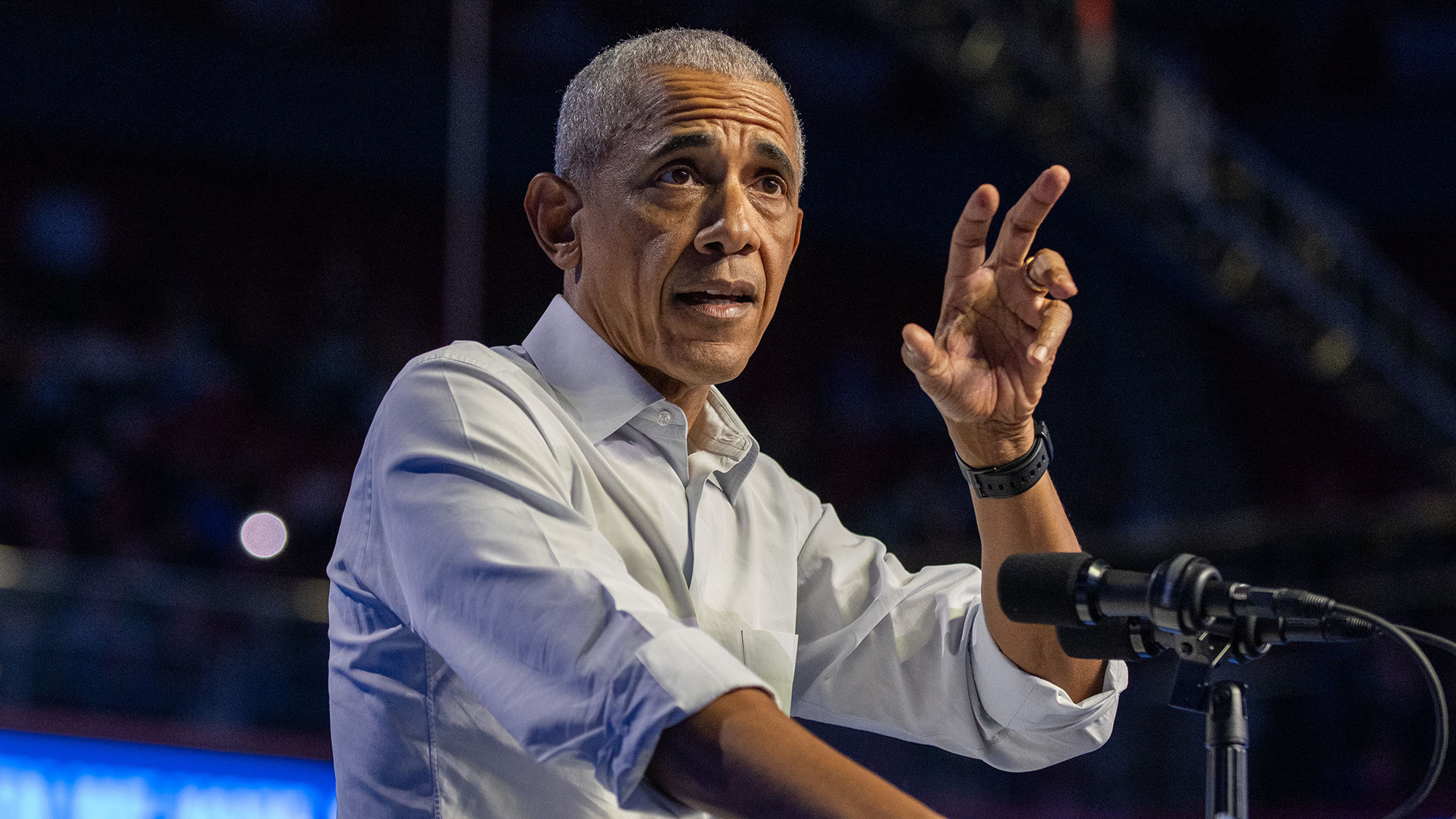Dark web: how Russian trolls spread fake news
In Depth: online agitators aim to erode trust in mainstream media and government institutions

A free daily email with the biggest news stories of the day – and the best features from TheWeek.com
You are now subscribed
Your newsletter sign-up was successful
A Facebook advertisement posted by a conservative group in 2016 calling itself “Heart of Texas” invited like-minded people to join a protest to “stop the Islamification of Texas”.
It was due to take place at noon on 21 May outside Houston’s Islamic Da’wah Center.
But in a different corner of Facebook, “United Muslims of America” were busy encouraging Texans to attend a Save Islamic Knowledge rally - scheduled for the same time and place.
The Week
Escape your echo chamber. Get the facts behind the news, plus analysis from multiple perspectives.

Sign up for The Week's Free Newsletters
From our morning news briefing to a weekly Good News Newsletter, get the best of The Week delivered directly to your inbox.
From our morning news briefing to a weekly Good News Newsletter, get the best of The Week delivered directly to your inbox.
When demonstrators arrived at the mosque, “interactions between the two groups eventually escalated into confrontation and verbal attacks”, The Texas Tribune reported.
What protesters didn’t realise was that neither group was real. Both were inventions of a Russian “troll farm” assigned to exploit political, racial and religious tensions - and using carefully targeted Facebook ads, Russia’s cyberwarriors orchestrated the ugly clash for the princely sum of $200 (£160).
This is just one example of an insidious and far-ranging campaign of Russian disinformation, the true scope and scale of which is now being unravelled by a US congressional investigation into the Kremlin’s influence on the 2016 presidential elections.
News you want to believe
A free daily email with the biggest news stories of the day – and the best features from TheWeek.com
In October, Facebook publicly acknowledged that Russia “used false identities and about 3,000 ads to spread politically divisive posts to Americans before and after the election”, the Daily Beast reports.
These Russian-run Facebook pages played a crucial role in disseminating “fake news”, promoting alt-right talking points and spreading conspiracy theories about Hillary Clinton and other Democrats.
At least 15 million Americans were exposed to content from 200 or so websites that were either operated by paid Russian trolls or by genuine conservative organisations using Russian propaganda as their source, according to a team of foreign policy and cybersecurity experts calling themselves PropOrNot.
“Some people involved seem genuinely unaware that they are being used by Russia to produce propaganda, but many others seem to know full well,” the group said a report cited by CNN.
“Many different groups spew fake news,” said PropOrNot, “but Russia is currently the industry leader.”
Using innocuous-sounding names such as Veterans Today and American.made, Russian-run “news” sources proved adept at adopting the language and tropes of American populist conservatism to exploit political, racial and religious tensions.
One Twitter account called Tea Party News - whose feed was filled with tweets such as: “Illegal Immigrants today... Democrat on welfare tomorrow!” - was actually being operated by a St Petersburg firm called the Federal News Agency, New York-based website Talking Points Memo reports.
Conspiracy theories
The flood of fake news has had strange and often dangerous consequences.
Among the many conspiracy theories about Clinton shared in conservative circles, one - known as Pizzagate - was so widely circulated that mainstream media outlets were forced to debunk it.
In December 2016, a man “investigating” the theory, which accused Clinton and other senior Democrats of running a child sex ring from a Washington DC pizzeria, opened fire with an automatic rifle inside the restaurant at the centre of the allegations. He was sentenced to four years in prison.
Interestingly, not all of the Russian-bought Facebook ads targeted conservatives. Some of the 3,000 adverts that have been turned over to US congressional investigators were for groups purporting to represent LGBT rights, black activism, or liberal politics.
It would be mistake to assume that the Russians’ goal was simply to elect Donald Trump, homeland cybersecurity expert Clint Watts told CNN.
"The goal is to erode trust in mainstream media, public figures, government institutions - everything that holds the unity of the Republic together."
Netizens
In addition to Facebook groups generating hundreds of thousands of clicks, shares and sometimes even real-life events, Russia’s cyberwarfare depends on a more subtle but no less influential army of trolls paid to masquerade as ordinary “netizens”.
In 2015, a former employee of a St Petersburg troll farm told The New York Times reporter Adrian Chen how some 400 employees were paid to flood news sites, social media and message boards with pro-Kremlin comments on hot-button topics such as the conflict in Ukraine.
“The point was to weave propaganda seamlessly into what appeared to be the non-political musings of an everyday person,” Chen reported.
For at least three years, English-speaking trolls have been posing as Americans online. Some of their earliest exercises include spreading reports of a police shooting of an unarmed black women in Atlanta and of an Isis attack on a Louisiana chemical plant - both fake, and both calculated to push politically emotive buttons.
As the election neared, accounts like these played a key role in amplifying the talking points being pushed by Russian-backed Facebook groups and news sites.
Troll unmasked
One high-profile example of this strategy is “Jenna Abrams”, a right-wing blogger recently unmasked as a Russian troll.
Abrams first appeared in 2014, posting “viral tweets on topics from Kim Kardashian’s naked selfie to feminism”, The Daily Telegraph reports.
However, in the months leading up to the election, “her messages quickly became more political”, pushing conservative talking points on divisive topics such as displaying the Confederate flag, and the Black Lives Matter movement, to more than 70,000 followers.
Even now, a year after the presidential election, Russian-linked accounts are still believed to be stoking political division among Americans.
Republican Senator James Lankford, who sits on the Senate Intelligence Committee, says that some of the most vocal tweets from both sides of the NFL kneeling protest were posted by paid Russian trolls posing as ordinary Americans.
Their goal is “to try to raise the noise level in America to try to make a big issue an even bigger issue, as they’re trying to just push divisiveness in the country”, he said at a recent hearing, reports The Washington Post.
The widespread exposure of the Kremlin’s cyberwarfare has only changed the nature of its power online, as opposed to its force: on social media and message boards, dissenting political opinions are frequently ascribed to Russian “shills” or “bots”.
Some undoubtedly are, but the increasing readiness of Americans to dismiss opposing viewpoints shows that the campaign to sow mistrust and sectarianism is working - and even the lords of the internet aren’t sure how far their grasp extends.
Representatives from Facebook, Twitter and Google appeared before the House Intelligence Committee on 1 November, when vice-chairman Senator Mark Warner asked them whether they believed they had uncovered the full extent of Russian meddling on their platforms, says TechCrunch.
“All three eventually admitted that they haven’t.”
-
 The ‘ravenous’ demand for Cornish minerals
The ‘ravenous’ demand for Cornish mineralsUnder the Radar Growing need for critical minerals to power tech has intensified ‘appetite’ for lithium, which could be a ‘huge boon’ for local economy
-
 Why are election experts taking Trump’s midterm threats seriously?
Why are election experts taking Trump’s midterm threats seriously?IN THE SPOTLIGHT As the president muses about polling place deployments and a centralized electoral system aimed at one-party control, lawmakers are taking this administration at its word
-
 ‘Restaurateurs have become millionaires’
‘Restaurateurs have become millionaires’Instant Opinion Opinion, comment and editorials of the day
-
 How corrupt is the UK?
How corrupt is the UK?The Explainer Decline in standards ‘risks becoming a defining feature of our political culture’ as Britain falls to lowest ever score on global index
-
 The high street: Britain’s next political battleground?
The high street: Britain’s next political battleground?In the Spotlight Mass closure of shops and influx of organised crime are fuelling voter anger, and offer an opening for Reform UK
-
 Is a Reform-Tory pact becoming more likely?
Is a Reform-Tory pact becoming more likely?Today’s Big Question Nigel Farage’s party is ahead in the polls but still falls well short of a Commons majority, while Conservatives are still losing MPs to Reform
-
 Taking the low road: why the SNP is still standing strong
Taking the low road: why the SNP is still standing strongTalking Point Party is on track for a fifth consecutive victory in May’s Holyrood election, despite controversies and plummeting support
-
 Trump attacks Obama as Epstein furor mounts
Trump attacks Obama as Epstein furor mountsSpeed Read The Trump administration accused the Obama administration of 'treasonous' behavior during the 2016 election
-
 What difference will the 'historic' UK-Germany treaty make?
What difference will the 'historic' UK-Germany treaty make?Today's Big Question Europe's two biggest economies sign first treaty since WWII, underscoring 'triangle alliance' with France amid growing Russian threat and US distance
-
 Is the G7 still relevant?
Is the G7 still relevant?Talking Point Donald Trump's early departure cast a shadow over this week's meeting of the world's major democracies
-
 Angela Rayner: Labour's next leader?
Angela Rayner: Labour's next leader?Today's Big Question A leaked memo has sparked speculation that the deputy PM is positioning herself as the left-of-centre alternative to Keir Starmer